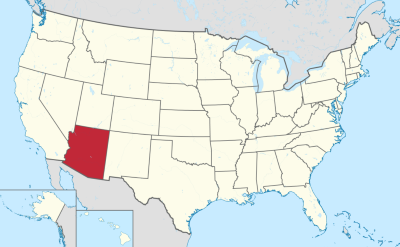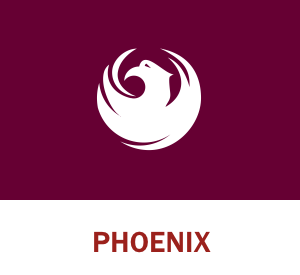Here you’ll find the largest list with Arizona web hosting reviews. We’ve listed all Arizona hosting providers with our UNCENSORED review and that of users.

Quick Facts
Internet speed: 16.2 Mbps (Average); 46 Mbps (Peak) (2015)
Population: 6.82 million
Broadband coverage: 86% of the population
Main Types of Connections: Fiber-optic, Cable, DSL
Average cost: $50 (Numbeo.com – May 2017)
Major ISPs: Cox, AT&T, Speedway, Getnet
Biggest Market Share: Cox – 33.29% (2015)
Major Colocation Datacenters: Phoenix NAP (biggest datacenter), Digital Realty, ViaWest, Inc.
Web Hosting Industry: Prosperous; there are many resellers
Internet in Arizona
Internet Speed
According to statistics published by fastmetrics.com, the state of Arizona has an average connection speed of 16.2 Mpbs and an average peak connection speed of 46 Mbps (3rd Quarter – 2015).
Population
In 2015, the population of Arizona was approximately 6.82 million. According to broadbandnow.com, 86% of the population is connected to a form of broadband connection, while the other 18% is either not connected to the Internet or using outdated technology, such as dial-up.
Main Types of Connections – Figures, Facts
The broadband Internet in Arizona comprises the following types of connections: Fiber-optic, Cable and DSL.
DSL is the most popular form of access to the Internet in Arizona, with 89.6% of Arizonans being connected to DSL Internet, closely followed by 84.2% for Cable Internet and a mere 2.7% for fiber optic Internet.
According to latest stats published by Numbeo.com, a typical subscription to 10 Mbps Internet in Arizona costs around $55 per month, which is above the national average of $50 per month, according to the same source.
However, compared to the rest of the United States, the local broadband infrastructure is much more developed. One important reason is the liberal legislation which promotes the growth of the infrastructure, as well as NGOs which actively support it, coupled with the fact that Arizona (Phoenix specifically) is a hotbed for colocation datacenter companies and web hosting companies, which bring in enough capital to entice local ISPs to invest in the development and expansion of the infrastructure.
Major ISPs – Stats and Prices
Major regional ISPs in Arizona include the following: Cox, AT&T, Cyber Speedway, Getnet, Inc., CommSpeed, Dakota Communications, DirectDSL, Phoenix Internet, etc.
Of these ISPs, Cox is the company which has the biggest market share of approximately 33.29% in 2015, according to data provided by WebpageFX, Inc.
Subscriptions prices at Cox start at $39.99 per month; the cheapest subscription includes speeds of 5 Mbps downlink and 1 Mpbs uplink. On the other hand, the most expensive plan starts at $89.99 per month and includes speeds of up to 300 Mbps downlink and up to 30 Mbps uplink. As of 2014, Cox offers 1Gbps Internet service in Phoenix, Tucson, Scottsdale, Mesa and Tempe. It is also offered in other states, such as Virginia, and Orange County California. By the end of 2017, Cox also expects to offer 1Gbps Internet service more widely across its coverage area using the DOCSIS 3.1 standard.
Internet in Arizona – Statistics, Figures, Development Strategies
Even though the Internet infrastructure in Arizona is quite developed compared to other states (the 28th most connected state in the US), some figures remain somewhat unsatisfactory: 22.2% of the people do not have access to 100 MBPS Internet service, only 1.70% have access to Gigabit service, while 3.80% do not have access to any type of wired Internet access technology whatsoever.
Metropolitan areas have sufficient core infrastructure to support the ever-increasing demand for broadband speeds, but in some pockets of metro areas and more notably in rural areas, there is extremely limited infrastructure and usually no more than one provider, which ultimately results in higher unjustified prices for end customers. Although this issue is not pointed out by customers, the problem still exists and action must be taken in consequence.
In order to support the continuous growth of the local Internet infrastructure and circumvent a “secluded” monopoly market in the countryside, the state of Arizona has recently put forth a comprehensive plan designed to encourage cooperation with providers, communities and non-profit organizations in order to find solutions for improving the broadband infrastructure and increase penetration in the countryside. The most important provisions contained in this plan are as follows:
– Encourage a significant increase in rural back haul investment by giving regional providers the opportunity to quote for services under the contract
– Increase allowed contract durations so that investments in new broadband infrastructure can produce reasonable returns on investments for providers
– Encourage the creation of geographic buying consortia to create a substantial number of anchored tenants for broadband services delivered across newly built broadband infrastructure
Arizona Hosting – List of Colocation Datacenters
According to datacentermap.com, there are currently 41 colocation datacenters from 2 areas in Arizona. A total of 36 datacenters are located in Phoenix, while the remaining 5 are located in Tucson.
In Phoenix, major colocation datacenters are as follows:
– Phoenix NAP (biggest datacenter)
– Digital Realty;
– ViaWest, Inc.;
– Telx PHX1 (operated by Digital Realty)
– Diversified Colocation Services
– ITAS
– CyrusOne Phoenix
– AFS Center
– Omnis
– Coloaz
In Tucson, major colocation datacenters are as follows:
– Involta Tucson
– TW Telecom
– Simply Bits, LLC
– Login, Inc.
Arizona Hosting – Colocation Datacenter Facts
A city in Arizona which boasts an extremely developed colocation datacenter infrastructure is Phoenix. Many reputed datacenter companies are concentrated in this particular city, namely IO, CyrusOne, Phoenix NAP and Digital Realty Trust. According to datacentermap.com, all the datacenter facilities located in Phoenix have a combined surface of 4,1 million square meters (4.5 million square feet). However, in the colocation datacenter industry, the actual square footage of the facility in which your servers are placed does not matter as much as the power capacity, measured in megawatts. Many companies, such as Digital Realty Trust, have already replaced square feet with megawatts as the primary benchmark for real estate details. Another pivotal reason why datacenters are being established in the area is the moderate costs for electricity, which basically allows them to buy and lease power for affordable prices which naturally attracts a plethora of customers.
The Phoenix datacenter market is one of the most active leasing markets in the world, and the second in the United States. Everything from the moderate electricity costs and low build costs to the low tax burdens is what has attracted millions of dollars worth of investments from tech, banking and Internet companies, along with many others.
For the sake of specificity, we shall highlight a few key reasons why Phoenix is such an attractive place for web hosting companies, . They are as follows:
– Extremely vast and developed infrastructure of fiber and cable. The existence of such an advanced infrastructure has rendered Phoenix a hub location in the routing of fiber from Los Angeles to Dallas, Denver, Chicago, as well as many other East Coast cities. This is probably the most important reason why, in general, the Arizona hosting industry is so developed, too.
– Close proximity to both Los Angeles and Las Vegas, which provides transportation and logistical access for organizations in their supply and value chain
– Very low risk for natural disasters (i.e. earthquakes). Conversely, other flourishing colocation datacenter hotbeds such as San Francisco are at a very high risk for natural disasters, according to the National Seismic Hazard Maps provided by usgs.gov.
– State law which promotes the growth of the colocation datacenter industry. On top of that, many NGOs such as the Arizona Datacenter Coalition push for legislation which makes Arizona competitive in their tax treatment of datacenters, compared to other state competitors, which obviously attracts many more companies that contribute to an ever-increasing market.
Arizona Hosting – Web Hosting Industry
The web hosting industry in Arizona is very developed, mainly due to the advanced infrastructure of fiber and cable, but also due to other economic aspects, such as moderate costs for electricity, internet, etc.
Interestingly enough, due to the plethora of colocation datacenter companies that there are in Arizona, many reseller web hosting companies have emerged as of late. What’s more, prices are actually competitive, so unassuming customers would have a hard time telling normal companies from reseller companies based on the first impression only.
However, companies which operate their own servers remain in the majority. Major colocation datacenter companies act as regular web hosting companies, too. For example, PhoenixNAP, the biggest colocation provider in Arizona, has a very interesting offering for web hosting, albeit only centered around top-grade hosting solutions. This means that Shared or VPS services are not available. The core of their offering is Dedicated Hosting, with prices starting at approximately $135 per month and going up to as much as $700 per month. A comprehensive tour of their enormous facility can be taken on their business website.
Another important colocation provider is ColoAZ, which also acts as a regular web hosting provider. As with PhoenixNAP, the core hosting service is Dedicated Hosting, with prices somewhat more affordable, but with more limited features. It should be noted that this company offers colocation within the PhoenixNAP facility, as is the case with most colocation/web hosting companies in the area.
Other companies which operate in the PhoenixNAP facility are: VaporNode, Simplicity, Madrooster.com, etc.


